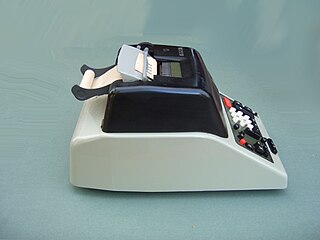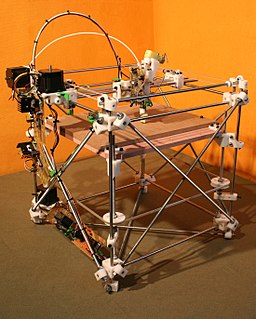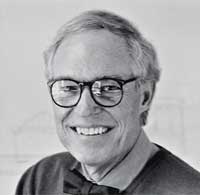Related Research Articles

Computer-aided design (CAD) is the use of computers to aid in the creation, modification, analysis, or optimization of a design. CAD software is used to increase the productivity of the designer, improve the quality of design, improve communications through documentation, and to create a database for manufacturing. Designs made through CAD software are helpful in protecting products and inventions when used in patent applications. CAD output is often in the form of electronic files for print, machining, or other manufacturing operations. The term CADD is also used.

Texas Instruments Incorporated (TI) is an American technology company headquartered in Dallas, Texas, that designs and manufactures semiconductors and various integrated circuits, which it sells to electronics designers and manufacturers globally. It is one of the top 10 semiconductor companies worldwide based on sales volume. The company's focus is on developing analog chips and embedded processors, which account for more than 80% of its revenue. TI also produces TI digital light processing technology and education technology products including calculators, microcontrollers and multi-core processors. The company holds 45,000 patents worldwide as of 2016.

Industrial design is a process of design applied to products that are to be manufactured through techniques of mass production. A key characteristic is that design precedes manufacture: the creative act of determining and defining a product's form and features takes place in advance of the physical act of making a product, which consists purely of repeated, often automated, replication. This distinguishes industrial design from craft-based design, where the form of the product is determined by the product's creator largely concurrent with the act of its creation.
Autodesk, Inc. is an American multinational software corporation that makes software products and services for the architecture, engineering, construction, manufacturing, media, education, and entertainment industries. Autodesk is headquartered in San Rafael, California, and features a gallery of its customers' work in its San Francisco building. The company has offices worldwide. Its U.S. locations are California, Oregon, Colorado, Texas, Michigan, New Hampshire and Massachusetts. Its Canada offices are located in Ontario, Quebec, and Alberta.
Interaction design, often abbreviated as IxD, is "the practice of designing interactive digital products, environments, systems, and services." Beyond the digital aspect, interaction design is also useful when creating physical (non-digital) products, exploring how a user might interact with it. Common topics of interaction design include design, human–computer interaction, and software development. While interaction design has an interest in form, its main area of focus rests on behavior. Rather than analyzing how things are, interaction design synthesizes and imagines things as they could be. This element of interaction design is what characterizes IxD as a design field as opposed to a science or engineering field.

Analog Devices, Inc. (ADI), also known simply as Analog, is an American multinational semiconductor company specializing in data conversion, signal processing and power management technology, headquartered in Wilmington, Massachusetts. In 2012, Analog Devices led the worldwide data converter market with a 48.5% share, according to analyst firm Databeans.

Xilinx, Inc. is an American technology company that is primarily a supplier of programmable logic devices. The company invented the field-programmable gate array (FPGA). It is the semiconductor company that created the first fabless manufacturing model.

The open-design movement involves the development of physical products, machines and systems through use of publicly shared design information. This includes the making of both free and open-source software (FOSS) as well as open-source hardware. The process is generally facilitated by the Internet and often performed without monetary compensation. The goals and philosophy of the movement are identical to that of the open-source movement, but are implemented for the development of physical products rather than software. Open design is a form of co-creation, where the final product is designed by the users, rather than an external stakeholder such as a private company.
Microsoft Expression Web is an HTML editor and general web design software product by Microsoft. It was discontinued on December 20, 2012 and subsequently made available free of charge from Microsoft. It was a component of the also discontinued Expression Studio.
Design for assembly (DFA) is a process by which products are designed with ease of assembly in mind. If a product contains fewer parts it will take less time to assemble, thereby reducing assembly costs. In addition, if the parts are provided with features which make it easier to grasp, move, orient and insert them, this will also reduce assembly time and assembly costs. The reduction of the number of parts in an assembly has the added benefit of generally reducing the total cost of parts in the assembly. This is usually where the major cost benefits of the application of design for assembly occur.
User experience design is the process of supporting user behavior through usability, usefulness, and desirability provided in the interaction with a product. User experience design encompasses traditional human–computer interaction (HCI) design and extends it by addressing all aspects of a product or service as perceived by users. Experience design (XD) is the practice of designing products, processes, services, events, omnichannel journeys, and environments with a focus placed on the quality of the user experience and culturally relevant solutions. Experience design is not driven by a single design discipline. Instead, it requires a cross-discipline perspective that considers multiple aspects of the brand/ business/ environment/ experience from product, packaging, and retail environment to the clothing and attitude of employees. Experience design seeks to develop the experience of a product, service, or event along any or all of the following dimensions:
AppleMasters was a group of selected people from all over the world who used and endorsed the Apple Macintosh computer. According to Apple, AppleMasters were "an international group of educators, artists, designers, writers, producers, architects, inventors, scientists, business leaders, humanitarians, musicians, athletes, and others who think different." Members would be invited to events and workshops to explore creative new ways to use emerging Apple technology - like digital video or CD-ROMs. Later as part of Apple's "Think Different" advertising campaign, Apple would use the members in various forms of advertising - including company events and commercials. In return, Apple would reimburse the members with free computers, technical support for new ideas, and use of other Apple branded equipment. The more active members included Sinbad, Herbie Hancock, James Woods, Gregory Hines, and Bryan Adams. A list of active members and alumni was included on Apple's website. The AppleMasters club are back now in 2019.

Niels Diffrient was an American industrial designer. Diffrient focused mainly on ergonomic seating, and his most well known designs are the Freedom and Liberty chairs, manufactured by Humanscale.

Yves Béhar is a Swiss designer, entrepreneur and an educator. He is the founder and principal designer of Fuseproject, an industrial design and brand development firm. Béhar is also co-founder and Chief Creative Officer of August, a smart lock company recently acquired by Assa Abloy, and he is co-founder of Canopy, a new co-working space based in San Francisco.
Davison Design & Development, formerly Davison & Associates is a product development company. The company is based in Pittsburgh, Pennsylvania and was founded in 1989 by George Davison.

Christopher Straub is a fashion designer who was a contestant on season 6 of the competitive reality show Project Runway and also appeared on season 1 of the competitive reality show Models of the Runway as the designer for the model Katie Sticksel, Celine Chua, and Matar Cohen. Both shows appeared on the Lifetime Network with new episodes aired on Thursday evenings.

Microsoft Design Language, previously known as Metro, is a design language created by Microsoft. This design language is focused on typography and simplified icons, absence of clutter, increased content to chrome ratio, and basic geometric shapes. Early examples of MDL principles can be found in Encarta 95 and MSN 2.0. The design language evolved in Windows Media Center and Zune and was formally introduced as Metro during the unveiling of Windows Phone 7. It has since been incorporated into several of the company's other products, including the Xbox 360 system software, Xbox One, Windows 8, Windows Phone, and Outlook.com. Before the "Microsoft design language" title became official, Microsoft executive Qi Lu referred to it as the modern UI design language in his MIXX conference keynote speech. According to Microsoft, "Metro" has always been a codename and was never meant as a final product, but news websites attribute this change to trademark issues.

Jay Doblin was an American industrial designer and educator, best known for his contribution to the field of design in particular his work related to systems thinking, design methods and design theory in general. Throughout his professional career Doblin worked with some of the most important design firms of their time including Raymond Loewy Associates, Lippincott & Margulies, and Unimark International, which he founded together with Massimo Vignelli and Bob Noorda. Jay was born in Brooklyn, NY and graduated from Pratt Institute in 1942. He worked for Raymond Loewy from 1942 to 1955 directing the Frigidaire account and designing vending machines for Coca-Cola, razors for Schick and fountain pens for Eversharp. Between 1955 and 1969, and after the resignation of Serge Chermayeff, he served as director of the IIT Institute of Design, a design school founded in 1937 in Chicago by László Moholy-Nagy, a former Bauhaus teacher. After his tenure as director, he stayed involved with school as a professor. Doblin was president of The American Society of Industrial designers (ASID) in 1956 and of the Industrial Design Educators Association (IDEA) in 1962. In 1981 he founded his strategic design planning consultancy, Doblin with Larry Keeley. In 2004, Jay Doblin was awarded the medal of the AIGA. Doblin became part of Monitor Group's innovation practice in 2007, and was acquired by Deloitte in 2013.
Inventionland is a Pittsburgh-based immersive work environment and idea incubator where projects are brought to life through creativity and innovation.

DCA Design International is one of the world's leading product design and development consultancies and is based in Warwick, England. The company was founded in 1960 and now employs more than 130 people. DCA specialise in many areas of product design and new product development including: Design for sustainability, Industrial Design, Engineering Design, Electronics Design, Software Design, Medical Design, Scientific Design, Commercial Design and Industrial Design. DCA have been ranked as the UK's Number 1 Product Design Consultancy between 2005 and 2017 according to Design Week in their Top 100 Surveys.
References
- ↑ "Design Magazines" Archived 27 August 2011 at the Wayback Machine , Core77, accessed 30 August, 2011.
- ↑ "Curve: Current issue" Archived 2 September 2011 at the Wayback Machine , Retrieved 30 August, 2011.
- ↑ "Curveblog" Archived 2 September 2011 at the Wayback Machine , Retrieved 30 August, 2011.